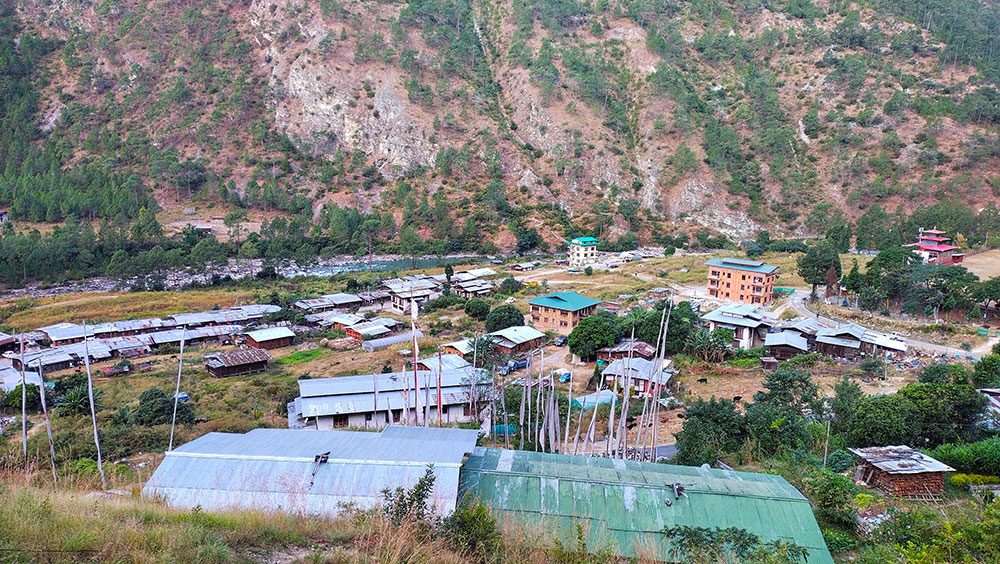Neten Dorji
Lhuentse – More than 30 shops in Autsho town, Lhuentse, which operate from makeshift huts, are still waiting for plot allotments to begin construction.
The shopkeepers have stated that they have requested the two elected governments and followed up with the relevant agencies several times, but nothing has come through as of now.
The government approved the Autsho satellite town in 2015.
There are more than 50 business license holders, with the same households holding more than one license.
Town representative, Chimi Dorji, said that although the government approved Autsho as a satellite town, it has still not developed into a proper town.
“Most of the makeshift huts are vulnerable to fire and other natural disasters,” he said. “Allotment of plots would benefit us immensely to construct permanent structures and provide quality services to customers.”
In the event of a fire incident, the town would have to wait for a few hours before the fire engine arrives from Lhuentse town, about 40km away from Autsho and 37km away from Mongar.
“Everything would be razed to the ground waiting for firefighting vehicles,” said Chimi Dorji. “It would be better if relevant agencies worked faster.”
Residents claimed that every time there is an election, the parties and candidates promise them town development.
“All political parties and local leaders pledged to develop the town, but it was forgotten after the election,” a resident said.
A businessman, Tshering Tashi, said most of them rented private land to construct shops after being asked to dismantle their temporary shelters and vacate state land.
“We were initially promised plots within a year when we were asked to dismantle our huts on state land. But it’s been more than three years, and we have been renting private land,” said Tshering Tashi.
He said that they could start construction instead of paying rent.
The plot demarcation, road network mapping and design, and layout of the town and architectural aspects were completed. Lagthrams for more than 80 private landowners were issued.
With the issuance of lagthrams and allowing landowners to construct houses on their plots, those without plots run the risk of being forced out.
A shopkeeper, Karma Deki, said three of the 14 plot owners have started construction, and other plot owners are procuring materials.
“After the government allowed construction in the town, private plot owners are asking us to vacate for new construction,” said Karma. “Where will we shift if the private plot owner asks us to vacate?”
She said most of them leased private plots to operate businesses and pay rent of Nu 12,000 annually.
Another shopkeeper, Chimi Wangmo, said that the new township would not only benefit the business community but also the pilgrims to sacred religious sites in the dzongkhag.
“The town has only one hotel. Residents can provide rooms and other services to those who want to halt at night,” said the mother.
Of the 164 plots demarcated in the town, 40 are on state land, and the dzongkhag is yet to receive an allotment order for plots after submitting documents to the National Land Commission (NLC).
Autsho satellite town will house different zones like the urban core precinct, residential precinct, environmental conservation precinct, and open space.
Following the directives from the NLC, Lhuentse dzongkhag administration developed the plot allotment criteria twice. The first allotment criteria were submitted in October 2018 and then sent again in July 2019 after a review.
There are around 40 plots on state land, and about 14 in the private area have been demarcated and developed. Each plot is approximately 10 decimals.
Meanwhile, the Lhuentse dzongkhag administration recently asked the NLC on the status of allotment of plots in Autsho satellite town and requesting plot allotments at the earliest possible.
“The development activities have been impacted by the unallotted plots on State land,” the letter stated.
Autsho town is the gateway to the dzongkhag and a business hub for Tsaenkhar, Jarey, and shopkeepers from other gewogs of Lhuentse, besides villages from Mongar’s adjoining gewogs Tsamang and Tsakaling.


